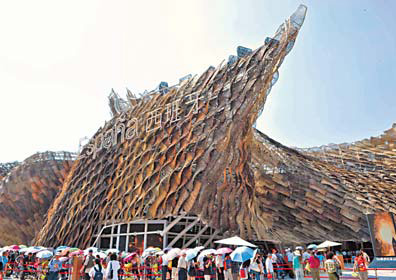 |
Large Medium Small |
After Wimbledon, soccer World Cup, country conquers Chinese hearts
|
 Tourists queue outside the Spanish Pavilion. Wu Jun / for China Daily |
SHANGHAI - Spain has assumed the mantle of overseas conqueror this month, recording economic and sporting victories in China and Africa in the face of high unemployment, sweeping government cutbacks and a negative credit rating.
It won Wimbledon, courtesy of Rafael Nadal, then the soccer World Cup in South Africa, and finally the hearts and minds of the Chinese, over 3 million of whom have entered its wicker basket-shaped pavilion halfway through the Shanghai Expo.
Hundreds of Spanish businesses have been quick to capitalize on having an $80-million PR machine docked in the heart of the Chinese market, said Maria Tena, commissioner-general of the pavilion.
"It's much better than we expected. We thought the consequences would be in the medium or long term. But there have already been nearly 3,000 business contacts made," she said.
Commercial activities are outlawed at World Expos, meaning these have taken place independently, or on the sidelines.
Tena cited the example of a businessman from Spain's transport sector who had been trying for months to win a contract to sell buses in China. After taking his client to the pavilion and dining with him there, a deal was struck immediately.
"It's very important that people are coming here and getting to know who we are, who is Spain, and that we have people who one can rely on to do business," said Tena.
Spain's success as one of the 10 most popular national pavilions in the Expo Garden is ultimately expected to create jobs back home - crucial for an economy that is facing unemployment rates of around 20 percent, the highest in over a decade.
More good news came in the form of a record rescue package for Greece. Engineered by the International Monetary Fund and euro-zone countries, it aims to pre-empt a domino effect of collapsing, debt-saddled European economies, with Spain at the center.
Nonetheless, Spain's financial woes have caused Expo officials to scrimp where they can. At the pavilion's World Cup final party two weeks ago, they borrowed the Belgium-EU Pavilion's biggest outdoor screen, while their own restaurant donated free food. Tena said plans to invite the national soccer team to the Expo were canceled for logistical not financial reasons.
Other European pavilions, such as Germany, described their attendance as a public diplomacy effort aimed at reflecting warming ties with China.
The US, which flirted with the idea of skipping the event until Secretary of State Hillary Clinton rallied the private sector for funding, has not been forced to penny-pinch because of the world recession, said pavilion CEO Martin Alintuck
"We've raised all the money that we needed ($61 million), and then we've continued to raise funds because we wanted to expand as much as possible the entertainment programs without hurting the cultural and educational programs on offer," he said.
"We've also got a lot of positive feedback," he said. "Sometimes when (US) President (Barack) Obama comes on (screen), people clap."
Meanwhile, the Greece Pavilion hosted its "Aphrodite" fashion week this week. Like most of its Expo 2010 activities, it went on as planned despite the country facing the prospect of being plunged into its deepest-ever recession.
Athens was in a state of panic this spring until historic bailout loans were arranged to help stave off bankruptcy and to restore the credibility of the Euro.
Greek officials, who shaved their initial Expo budget by 40 percent, from 12 million euros ($15.6 million) to less than 7 million euros, said they were hoping to improve their balance of trade with China.
"We seize this opportunity to project our country as an investment pole and to promote our trade and especially our exports to China, by reversing today's ratio of one to 30," said Nadia Rodoyanni, CEO of the Hellenic Foreign Trade Board.
She was referring to a trade imbalance that saw 99 million euros of Greek imports to China last year compared to 3 billion euros of Chinese exports.
"The recent visit to Greece by Zhang Dejiang, vice-premier of the People's Republic of China, and the signing of many important agreements between Greek exporters and Chinese trading companies highlight the possibilities for mutually beneficial synergies in a wide range of economic activities," said Theodore Georgakelos, the Greek ambassador in Beijing.
China Daily